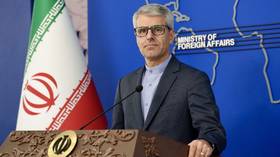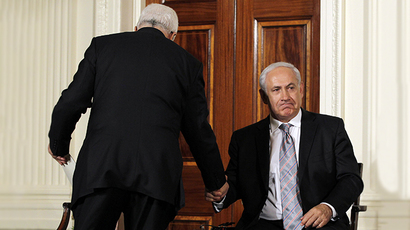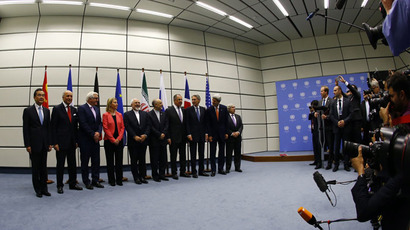US to release Israeli spy Jonathan Pollard - lawyers
Israeli spy Jonathan Pollard will be paroled in November after serving almost 30 years in prison, his lawyers say. The US government has denied that Pollard’s release might be a political gesture aimed at Israel in the wake of a nuclear deal with Iran.
The former US Navy intelligence analyst, Pollard was caught spying for Israel in 1985. He pleaded guilty on charges of espionage in 1987, and was sentenced to life in prison. Israel, which dubbed Pollard the ‘Prisoner of Zion,’ gave him citizenship in 1995 and has lobbied for his release ever since.
Pollard’s lawyers announced Tuesday that he would be released in November. According to Eliot Lauer and Jacques Semmelman, the US Department of Justice notified them in early July that it would not seek to deny Pollard parole at the July 7 hearing.
"The decision is not connected to recent developments in the Middle East," Lauer and Semmelman said in a statement.
Ayelet Shaked, Israeli minister of Justice, says US Parole Commission decides to release Jonathan Pollard on Nov. 20 https://t.co/hAqBbzsUNr
— Ron Kampeas (@kampeas) July 28, 2015This echoes the words of National Security Council spokesman Alistair Baskey, who said last week that Pollard’s status would be determined according to standard procedures. “There is absolutely zero linkage between Mr. Pollard’s status and foreign policy considerations,” Baskey said, according to the New York Times.
“No, no, no,” US Secretary of State John Kerry told reporters, dismissing speculation that Pollard’s release could be related to the Iran nuclear agreement, reached on July 14 in Vienna. “Truthfully, I haven't even had a conversation with them,” he said, referring to the Israelis.
The Israeli government has opposed the agreement for months, claiming it would not prevent Iran from obtaining a nuclear weapon and threatening Israel’s security. Pro-Israeli groups are presently lobbying the US Congress to vote against the treaty.
US Government wants to hang Edward Snowden for leaking secrets to the American public but pardons Jonathan Pollard for leaking to Israel.
— D (@Delo_Taylor) July 28, 2015Though the US government officially denies any relation between Pollard’s release and the Iran deal, Washington will welcome the perceived linkage, Robert Naiman of Just Foreign Policy told RT.
“They will try to derive some benefit from letting people think ‘Look, we’re being nice to Israel. Ok, you’re mad about the Iran nuclear deal; we’re sorry, we have to do this anyway. But now here’s Jonathan Pollard'," Naiman said.
Israelis, however, aren’t inclined to see Pollard’s release as token of goodwill after the Iran deal, says Boaz Bismuth, editor at Israel Today. “For the Israelis there is no connection whatsoever,” he told RT, as they regard the release as “something totally normal.” There is little the US can do to sweeten the bitter Iran deal, Bismuth argues, adding that the tensions between the US and Israel will continue until Congress makes a decision on whether to support the agreement.
MKs hail Pollard release; Shaked denies link to Iran deal http://t.co/uTXpjliXDB
— The Times of Israel (@TimesofIsrael) July 28, 2015Pollard confessed to giving Israel information on Iraqi and Syrian chemical weapons, the Pakistani nuclear program, Soviet arms shipments to Arab states, and lines of communication of various governments in the Middle East and North Africa.
Successive US administrations have resisted calls to release Pollard, saying that his betrayal caused significant harm to US intelligence efforts. His former boss at the Office of Naval Intelligence, retired admiral Thomas Brooks, has said that Pollard revealed the methods used by the US to collect information, specifically against the Soviet Union. “I think what he did was exceeded only by Edward Snowden,” Brooks said in an interview last year.
However, the Obama administration has apparently been willing to use Pollard’s release as a bargaining chip in dealings with Israel. In December 2013, Israel’s Channel 10 announced that the US Secretary of State John Kerry offered to release Pollard once Tel Aviv freed the fourth and final batch of Palestinian prisoners.














